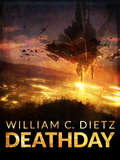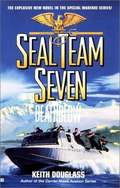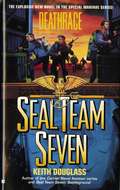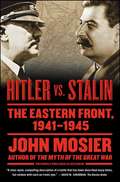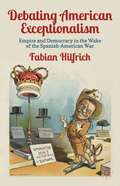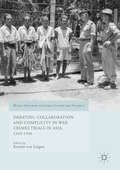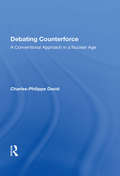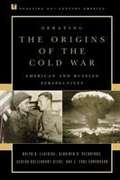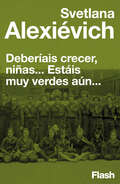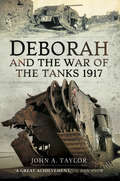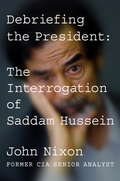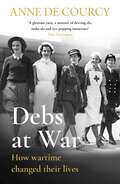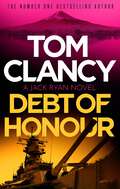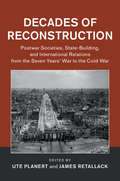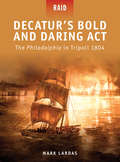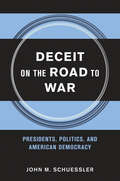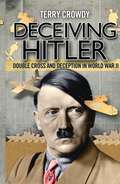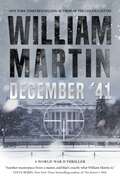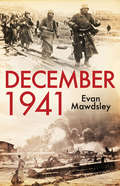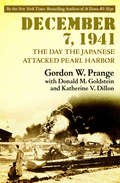- Table View
- List View
DeathDay (Sauron #1)
by William C. DietzEnslaved after the slaughter of billions by a violent race of aliens called the Saurons, Earth's few remaining humans are forced into back breaking labor building mysterious temples for their new masters. The captors claim that these temples, once finished, will allow them to leave Earth in peace once again. They enlist Alexander Franklin, former governor of Washington, as the head of their puppet government to help manage their mission. Meanwhile, a group of escaped slaves form a resistance movement which grows with each passing day.When former government bodyguard Jack Manning, well-versed in the art of survival, finds himself placed in the center of power as security for Franklin, he learns the brutal truth behind the temples. He faces an agonizing choice: to stay where he is, alongside the woman he loves, or to aid the rebels and their fight for freedom. The survival of the human race hangs in the balance.With intense, fast paced action, an unforgettable hero and a riveting story, DeathDay is the first book in a series by bestselling science fiction author William C. Dietz.
Deathblow (Seal Team Seven, #14)
by Keith DouglassThe mission begins after China and Pakistan launch offensives without warning against Nepal and Bangladesh. The U.N. Security Council is baffled. Why would China ally itself with India's northern neighbor? They soon learn the Chinese secretly plan to occupy Pakistan and take their oil reserves. Only one irrepressible force stands a chance against the formidable Chinese army: The elite SEAL Team Seven. But they'll have to walk a fine line, for even a slight slip could lead to a full-blown nuclear war.
Deathrace (Seal Team Seven, #7)
by Keith DouglassIran is building nuclear devices, and it's up to Murdock and his platoon to stop them. Only one person is qualified to dismantle the warheads, an expert by the name of Katherine Garnet. But how's a female civilian supposed to keep up with the SEALs?
Deathride
by John MosierThe German invasion of the Soviet Union on June 22, 1941, began a war that lasted nearly four years and created by far the bloodiest theater in World War II. In the conventional narrative of this war, Hitler was defeated by Stalin because, like Napoleon, he underestimated the size and resources of his enemy. In fact, says historian John Mosier, Hitler came very close to winning and lost only because of the intervention of the western Allies. Stalin's great triumph was not winning the war, but establishing the prevailing interpretation of the war. The Great Patriotic War, as it is known in Russia, would eventually prove fatal, setting in motion events that would culminate in the collapse of the Soviet Union.Deathride argues that the Soviet losses in World War II were unsustainable and would eventually have led to defeat. The Soviet Union had only twice the population of Germany at the time, but it was suffering a casualty rate more than two and a half times the German rate. Because Stalin had a notorious habit of imprisoning or killing anyone who brought him bad news (and often their families as well), Soviet battlefield reports were fantasies, and the battle plans Soviet generals developed seldom responded to actual circumstances. In this respect the Soviets waged war as they did everything else: through propaganda rather than actual achievement. What saved Stalin was the Allied decision to open the Mediterranean theater. Once the Allies threatened Italy, Hitler was forced to withdraw his best troops from the eastern front and redeploy them. In addition, the Allies provided heavy vehicles that the Soviets desperately needed and were unable to manufacture themselves. It was not the resources of the Soviet Union that defeated Hitler but the resources of the West. In this provocative revisionist analysis of the war between Hitler and Stalin, Mosier provides a dramatic, vigorous narrative of events as he shows how most previous histories accepted Stalin's lies and distortions to produce a false sense of Soviet triumph. Deathride is the real story of the Eastern Front, fresh and different from what we thought we knew.
Debating American Exceptionalism
by Fabian HilfrichThe Spanish-American War focused not only on foreign policy, but also on the nation's very essence and purpose. At the heart of this debate was a consensus on American nationalism. This book explains why the belief in exceptionalism still serves as the basis of American nationalism and foreign policy even in spite of more recent military failures.
Debating Collaboration and Complicity in War Crimes Trials in Asia, 1945-1956
by Kerstin Von LingenThis innovative volume examines the nexus between war crimes trials and the pursuit of collaborators in post-war Asia. Global standards of behaviour in time of war underpinned the prosecution of Japanese military personnel in Allied courts in Asia and the Pacific. Japan's contradictory roles in the Second World War as brutal oppressor of conquered regions in Asia and as liberator of Asia from both Western colonialism and stultifying tradition set the stage for a tangled legal and political debate: just where did colonized and oppressed peoples owe their loyalties in time of war? And where did the balance of responsibility lie between individuals and nations? But global standards jostled uneasily with the pluralism of the Western colonial order in Asia, where legal rights depended on race and nationality. In the end, these limits led to profound dissatisfaction with the trials process, despite its vast scale and ambitious intentions, which has implications until today.
Debating Counterforce: A Conventional Approach In A Nuclear Age
by Charles-Philippe DavidSince the U.S. presidential elections of 1980, debate has intensified between those who believe that nuclear weapons can only deter a war not intended to be fought and those who see nuclear weapons as an advancement in weaponry that allows for the waging and winning of a nuclear war. At the focal point of this debate is the rise of the “counterforc
Debating the Origins of the Cold War: American and Russian Perspectives (Debating Twentieth-Century America)
by Vladimir Pechatnov Ralph Levering Verena Botzenhart-Viehe C. EdmondsonDebating the Origins of the Cold War examines the coming of the Cold War through Americans' and Russians' contrasting perspectives and actions. In two engaging essays, the authors demonstrate that a huge gap existed between the democratic, capitalist, and global vision of the post-World War II peace that most Americans believed in and the dictatorial, xenophobic, and regional approach that characterized Soviet policies. The authors argue that repeated failures to find mutually acceptable solutions to concrete problems led to the rapid development of the Cold War, and they conclude that, given the respective concerns and perspectives of the time, both superpowers were largely justified in their courses of action. Supplemented by primary sources, including documents detailing Soviet espionage in the United States during the 1930s and 1940s and correspondence between Premier Josef Stalin and Foreign Minister V. M. Molotov during postwar meetings, this is the first book to give equal attention to the U.S. and Soviet policies and perspectives.
Debatten um die Wehrpflicht: Friedensethik nach der Zeitenwende • Band 2 (Gerechter Frieden)
by Ines-Jacqueline WerknerDeutschland hat lange an der Wehrpflicht festgehalten und gehörte zu den letzten Ländern in Europa, die diese mit dem Ende des Kalten Krieges und dem Ausrufen der Friedensdividende ausgesetzt und sich für eine Freiwilligenarmee entschieden haben. Inzwischen haben sich die Konstellationen, die zu diesem Wandel führten, angesichts des russischen Angriffs auf die Ukraine erneut radikal verändert. Das gilt nicht nur für Deutschland, sondern europaweit. Mit der Refokussierung auf die Landes- und Bündnisverteidigung gehen wieder größere Streitkräfteumfänge wie auch die Notwendigkeit eines umfassenden Pools von Reservekräften einher. So sind Debatten darüber entfacht, wie sich die aktuellen Herausforderungen, vor allem Fragen der Personalgewinnung, am besten lösen lassen. Das reicht von einer möglichen Wiedereinführung einer wie auch immer gearteten Wehrpflicht bis hin zu einer allgemeinen Dienstpflicht. Die Autorinnen und Autoren dieses Bandes beleuchten die Auswirkungen solcher Pflichtdienste – militärisch, politisch wie gesellschaftlich – und reflektieren die mit der Zeitenwende einhergehenden Anforderungen an die Wehrhaftigkeit.
Deberíais crecer, niñas... estáis muy verdes aún
by Svetlana AlexievichLa ganadora del Premio Nobel de literatura, Svetlana Alexiévich, le da vida a las numerosas voces de aquellas mujeres silenciadas por la guerra. Deberíais crecer, niñas... Estáis muy verdes aún... Es uno de los fragmentos del ensayo La guerra no tiene rostro de mujer: un corpus formado por los desgarradores testimonios de aquellas que vivieron la guerra en sus propias carnes. Mujeres que lucharon, que resistieron, que fueron voluntarias, que fueron arrastradas; mujeres que salvaron y arrebataron vidas durante la Segunda Guerra Mundial. «Estaba embarazada del segundo... Mi hijo tenía dos años, yo estaba encinta. Estalló la guerra. Mi marido combatía en el frente. Me fui al pueblo donde vivían mis padres e hice... Ya me entiende... Aborté... En aquella época estaba prohibido... ¿Cómo podía dar a luz? Alrededor había tanto dolor... ¡La guerra! ¿Cómo se puede dar a luz si te rodea la muerte?»
Deberíais crecer, niñas... estáis muy verdes aún
by Svetlana AlexievichLa ganadora del Premio Nobel de literatura, Svetlana Alexiévich, le da vida a las numerosas voces de aquellas mujeres silenciadas por la guerra. Deberíais crecer, niñas... Estáis muy verdes aún... Es uno de los fragmentos del ensayo La guerra no tiene rostro de mujer: un corpus formado por los desgarradores testimonios de aquellas que vivieron la guerra en sus propias carnes. Mujeres que lucharon, que resistieron, que fueron voluntarias, que fueron arrastradas; mujeres que salvaron y arrebataron vidas durante la Segunda Guerra Mundial. «Estaba embarazada del segundo... Mi hijo tenía dos años, yo estaba encinta. Estalló la guerra. Mi marido combatía en el frente. Me fui al pueblo donde vivían mis padres e hice... Ya me entiende... Aborté... En aquella época estaba prohibido... ¿Cómo podía dar a luz? Alrededor había tanto dolor... ¡La guerra! ¿Cómo se puede dar a luz si te rodea la muerte?»
Deborah and the War of the Tanks
by John TaylorDeborah is a British First World War tank that rose from the grave after taking part in one of the most momentous battles in history. In November 1917 she played a leading role in the first successful massed tank attack at Cambrai. Eighty years later, in a remarkable feat of archaeology, the tanks buried remains were rediscovered and excavated, and are now preserved as a memorial to the battle and to the men who fought in it. John Taylors book tells the tale of the tank and her crew and tracks down their descendants to uncover a human story every bit as compelling as the military one.
Debriefing the President: The Interrogation of Saddam Hussein
by John NixonIn December 2003, after one of the largest, most aggressive manhunts in history, US military forces captured Iraqi president Saddam Hussein near his hometown of Tikrit. Beset by body-double rumors and false alarms during a nine-month search, the Bush administration needed positive identification of the prisoner before it could make the announcement that would rocket around the world. At the time, John Nixon was a senior CIA leadership analyst who had spent years studying the Iraqi dictator. Called upon to make the official ID, Nixon looked for telltale scars and tribal tattoos and asked Hussein a list of questions only he could answer. The man was indeed Saddam Hussein, but as Nixon learned in the ensuing weeks, both he and America had greatly misunderstood just who Saddam Hussein really was. Debriefing the President presents an astounding, candid portrait of one of our era’s most notorious strongmen. Nixon, the first man to conduct a prolonged interrogation of Hussein after his capture, offers expert insight into the history and mind of America’s most enigmatic enemy. After years of parsing Hussein’s leadership from afar, Nixon faithfully recounts his debriefing sessions and subsequently strips away the mythology surrounding an equally brutal and complex man. His account is not an apology, but a sobering examination of how preconceived ideas led Washington policymakers—and the Bush White House—astray. Unflinching and unprecedented, Debriefing the President exposes a fundamental misreading of one of the modern world’s most central figures and presents a new narrative that boldly counters the received account.From the Trade Paperback edition.
Debs at War: 1939-1945
by Anne de CourcyAn extraordinary account - from firsthand sources - of upper class women and the active part they took in the WarPre-war debutantes were members of the most protected, not to say isolated, stratum of 20th-century society: the young (17-20) unmarried daughters of the British upper classes. For most of them, the war changed all that for ever. It meant independence and the shock of the new, and daily exposure to customs and attitudes that must have seemed completely alien to them. For many, the almost military regime of an upper class childhood meant they were well suited for the no-nonsense approach needed in wartime. This book records the extraordinary diversity of challenges, shocks and responsibilities they faced - as chauffeurs, couriers, ambulance-drivers, nurses, pilots, spies, decoders, factory workers, farmers, land girls, as well as in the Women's Services. How much did class barriers really come down? Did they stick with their own sort? And what about fun and love in wartime - did love cross the class barriers?
Debs at War: 1939-1945 (WOMEN IN HISTORY)
by Anne de CourcyAn extraordinary account - from firsthand sources - of upper class women and the active part they took in the WarPre-war debutantes were members of the most protected, not to say isolated, stratum of 20th-century society: the young (17-20) unmarried daughters of the British upper classes. For most of them, the war changed all that for ever. It meant independence and the shock of the new, and daily exposure to customs and attitudes that must have seemed completely alien to them. For many, the almost military regime of an upper class childhood meant they were well suited for the no-nonsense approach needed in wartime. This book records the extraordinary diversity of challenges, shocks and responsibilities they faced - as chauffeurs, couriers, ambulance-drivers, nurses, pilots, spies, decoders, factory workers, farmers, land girls, as well as in the Women's Services. How much did class barriers really come down? Did they stick with their own sort? And what about fun and love in wartime - did love cross the class barriers?
Debt of Honor (Jack Ryan #6)
by Tom Clancy'A crackling good read' -- Washington PostRazio Yamata is one of Japan's most influential industrialists. He has devised a plan to cripple American superiority and elevate Japan to a position of dominance on the world stage. His motivation is to pay off a debt of honour to his parents and bring low the country he feels was responsible for their deaths - America. All he needs is a catalyst to set his plan in motion. When the faulty gas tank on one Tennessee family's car leads to their fiery death, an opportunistic US congressman uses the occasion to rush a new trade law through the system. The law is designed to squeeze Japan economically. Instead, it provides Yamata with the leverage he needs. As Yamata's plan begins to unfold, it becomes clear to the world that someone is launching a fully integrated operation against the United States. There's only one man to find out who the culprit is - Jack Ryan, the new President's National Security Advisor.
Debutante
by Anne MelvilleFour debutants find friendship as they seek love in a time of war in this WWII-era historical romance by the author of the Lorimer Family novels. England, 1939. Aristocratic families are preparing to present their daughters as debutantes, introducing them to society through a season of elegant parties. Bidding childhood farewell, the debutantes are thrust into a world of dancing, gossip, and young gentlemen, glamorous but fraught with rivalry. Ronnie, Peggy, Isabelle, and Anne could not be more different; four girls from four different worlds. Yet when their lives converge, they begin to rely on each other in ways they could never have imagined. But as World War II quickly approaches, it soon becomes clear that this season will be unlike any before. The world is changing, and all four young ladies will soon find their lives irrevocably changed along with it.
Decades of Reconstruction: Postwar Societies, State-Building, and International Relations from the Seven Years' War to the Cold War (Publications of the German Historical Institute)
by James Retallack Ute PlanertAs wars and other conflicts increase on a worldwide scale, the alleged 'new wars' of the present day have taught that military victory does not necessarily result in a sustained state of peace. Rather, societies in conflict experience a 'status mixtus' - a transformative period that includes substantial changes in economy, politics, society and culture. Focusing on these decades of reconstruction in Europe and North America, this book examines the transformation of state systems, international relations, and normative principles in international comparison. By putting the postwar decade after 1945 into a long-term historical perspective, the chapters illuminate new patterns of transition between war and peace from the eighteenth to the twentieth century. Experts in the field show that states and societies are never restituted from a 'zero hour'. They also demonstrate that foreign and domestic policy are intermixed before and after peace breaks out.
Decatur's Bold and Daring Act- The Philadelphia in Tripoli 1804
by Steve Noon Mark LardasOn a dark night in 1804, Lt. Stephen Decatur and a team of hand-picked men, slipped into Tripoli harbor in a small boat. Their target was the USS Philadelphia. Captured by the Barbary pirates four months previously, the Philadelphia had been refitted to fight against her former masters. Decatur's mission was to either recapture the ship, or failing that, burn her to the waterline. This book recounts one of the greatest raids in American military history, an event that propelled Stephen Decatur to international renown, and which prompted Horatio Nelson to declare it 'the most bold and daring act of the age'.
Deceit on the Road to War: Presidents, Politics, and American Democracy (Cornell Studies in Security Affairs)
by John M. SchuesslerIn Deceit on the Road to War, John M. Schuessler examines how U.S. presidents have deceived the American public about fundamental decisions of war and peace. Deception has been deliberate, he suggests, as presidents have sought to shift blame for war onto others in some cases and oversell its benefits in others. Such deceit is a natural outgrowth of the democratic process, in Schuessler's view, because elected leaders have powerful incentives to maximize domestic support for war and retain considerable ability to manipulate domestic audiences. They can exploit information and propaganda advantages to frame issues in misleading ways, cherry-pick supporting evidence, suppress damaging revelations, and otherwise skew the public debate to their benefit. These tactics are particularly effective before the outbreak of war, when the information gap between leaders and the public is greatest. When resorting to deception, leaders take a calculated risk that the outcome of war will be favorable, expecting the public to adopt a forgiving attitude after victory is secured. The three cases featured in the book--Franklin Roosevelt and World War II, Lyndon Johnson and the Vietnam War, and George W. Bush and the Iraq War--test these claims. Schuessler concludes that democracies are not as constrained in their ability to go to war as we might believe and that deception cannot be ruled out in all cases as contrary to the national interest.
Deceiving Hitler: Double-cross and Deception in World War II
by Terry CrowdyDuring the Second World War the Allies controlled every active German agent in Britain. This placed Allied Intelligence services in a unique position. The Allies were able to feed spurious information back to Germany which mixed scraps of truthful information with misleading details in a believable mix of information. Out of this process of deception grew an entire organization which specialized in the manufacture of elaborate deceptions to confuse and hinder Axis powers. To maintain the deception, complex camouflage and tactical deception operations were to be undertaken on the ground, involving the use of inflatable tanks, fake towns which misdirected the German blitz, bogus troop formations and a catalog of Hollywood-style special effects. At times bizarre and often intriguing, these operations were used in all the major theaters of the war and saved countless Allied lives. From disappearing North African pipelines to bogus radio stations, this book is an entertaining and absorbing account of the deceptions used by the Allies in World War II. The third in a series of books by Terry Crowdy that exposes the underworld of military history, Deception uses rare, recently declassified information and photographs, much of which is being made available to the public for the first time to reveal the art of military misdirection.
December '41: A World War II Thriller
by William MartinFrom New York Times bestselling author William Martin comes a WWII thriller as intense as The Day of the Jackal and as gripping as The Eye of the Needle. In December '41, Martin takes us on the ultimate manhunt, a desperate chase from Los Angeles to Washington, D. C., in the first weeks of the Second World War. On the day after Pearl Harbor, shocked Americans gather around their radios to hear Franklin Roosevelt declare war. In Los Angeles, a German agent named Martin Browning is planning to kill FDR on the night he lights the National Christmas Tree. Who will stop him? Relentless FBI Agent Frank Carter? Kevin Cusack, a Hollywood script reader who also spies on the German Bund of Los Angeles, and becomes a suspect himself? Or Vivian Hopewell, the aspiring actress who signs on to play Martin Browning's wife and cannot help but fall in love with him?The clock is ticking. The tracks are laid. The train of narrow escapes, mistaken identities, and shocking deaths is right on schedule. It's a thrilling ride that will sweep you from the back lots of Hollywood to the speeding Super Chief to that solemn Christmas Eve, when twenty thousand people gather on the South Lawn of the White House and the lives of Franklin Roosevelt and his surprise guest, Winston Churchill, hang in the balance.“A remarkable story that will keep you reading late into the night.”—Catherine Coulter, #1 New York Times bestselling author of Vortex“Instantly cinematic and endlessly entertaining, December '41 is an absolute page turner.”—Hank Phillippi Ryan, USA Today bestselling author of Her Perfect LifeAt the Publisher's request, this title is being sold without Digital Rights Management Software (DRM) applied.
December 1941: Twelve Days that Began a World War
by Evan MawdsleyAn account of the dramatic turning point in World War II that marked &“the dawn of American might and the struggle for supremacy in Southeast Asia&” (Times Higher Education). In far-flung locations around the globe, an unparalleled sequence of international events took place between December 1 and December 12, 1941. In this riveting book, historian Evan Mawdsley explores how the story unfolded . . . On Monday, December 1, 1941, the Japanese government made its final decision to attack Britain and America. In the following days, the Red Army launched a counterthrust in Moscow while the Japanese bombed Pearl Harbor and invaded Malaya. By December 12, Hitler had declared war on the United States, the collapse of British forces in Malaya had begun, and Hitler had secretly laid out his policy of genocide. Churchill was leaving London to meet Roosevelt as Anthony Eden arrived in Russia to discuss the postwar world with Stalin. Combined, these occurrences brought about a &“new war,&” as Churchill put it, with Japan and America deeply involved and Russia resurgent. This book, a truly international history, examines the momentous happenings of December 1941 from a variety of perspectives. It shows that their significance is clearly understood only when they are viewed together. &“Marks the change from a continental war into a global war in an original and interesting way.&”—The Sunday Telegraph Seven (Books of the Year) &“Suspenseful . . . Mawdsley embarks on the action from the first day and never lets up in this crisp, chronological study . . . A rigorous, sharp survey of this decisive moment in the war.&”—Kirkus Reviews
December 7, 1941: The Day the Japanese Attacked Pearl Harbor
by Gordon W. Prange Donald M. Goldstein Katherine V. DillonA minute-by-minute account of the morning that brought America into World War II, by the New York Times–bestselling authors of At Dawn We Slept. When dawn broke over Hawaii on December 7, 1941, no one suspected that America was only minutes from war. By nightfall, the naval base at Pearl Harbor was a smoldering ruin, and over 2,000 Americans lay dead. December 7, 1941 gives a detailed and immersive real-time account of that fateful morning. In or out of uniform, every witness responded differently when the first Japanese bombs began to fall. A chaplain fled his post and spent a week in hiding, while mess hall workers seized a machine gun and began returning fire. Some officers were taken unawares, while others responded valiantly, rallying their men to fight back and in some cases sacrificing their lives. Built around eyewitness accounts, this book provides an unprecedented glimpse of how it felt to be at Pearl Harbor on the day that would live in infamy.
December Stillness
by Mary Downing HahnSensitive and idealistic fifteen-year-old Kelly McAllister feels at odds with everyone around her. Her best friend has suddenly turned boy crazy. Her talented mother creates greeting card designs instead of real art, and her father never talks to her about anything except working hard and getting ahead.<P><P> That's why Kelly becomes so involved in the plight of a homeless Vietnam vet who takes refuge in the library each day. Interviewing him began as a Social Studies project, but it takes on new meaning after her offers of food and friendship backfire into a real disaster.What had the war done to destroy this man? And what had it done to her own father, who had been to the same war ... and refuses to speak of it?<P> Jane Addams Children’s Book Award Honor Book
